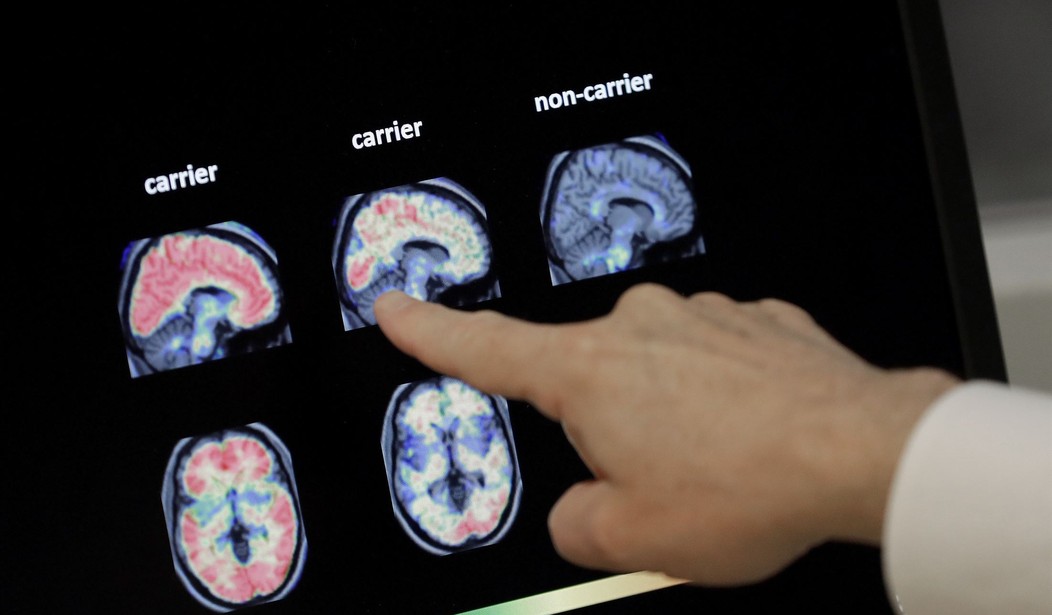My family has been very fortunate in that all of us generally retain our mental ability into old age. My paternal grandfather made it to 90 and was sharp until the end. Ditto for my maternal grandmother, who lasted to 88, and while my maternal grandfather died at 78, his mental health was never an issue. My parents retained their wits until they died at 90 and 94. But my family has painful acquaintance with dementia nevertheless; I lost two aunts by marriage, both lovely people who we loved dearly, to complications of Alzheimer's disease; their passing was prolonged and horrible for my Mom's two brothers whose wives they were. Later, my sister lost her husband after a decade-long struggle with non-Alzheimer's dementia. No matter what manner of mental decline is in question, it's an awful thing; families have to suffer from watching a loved one deteriorate, sometimes into a comatose state.
Because of this, I found it interesting to read that Alzheimer's disease has been found to have spread through a once-common (but no longer) medical procedure.
The most common type of dementia, Alzheimer’s is caused by a buildup of amyloid proteins in the brain, with risk factors including age, family history, unhealthy lifestyle behaviors and certain medical conditions.
But in a study published in Nature Medicine, researchers from the University College London (UCL) linked growth hormone treatments to the development of Alzheimer’s, according to a UCL press release.
The researchers studied patients who received a type of human growth hormone that was extracted from the pituitary glands of deceased people (c-hGH).
The c-hGH has been shown to lead to greater amounts of amyloid-beta protein in the brain, the researchers found.
After the COVID-19 mess, it's easy to jump on the medical profession over something like this, but it's important to note a couple of things here:
- The treatment in question has not been used for almost 40 years, having been abandoned in 1985 when it was found to possibly spread Creutzfeldt-Jakob disease (CJD,) which can also cause dementia, brain damage, and death.
- There always have been and always will be unforeseen complications in developing any new treatment or procedure. That's because the development of techniques can never encompass every possible complication and because our best experimental models are laughably crude compared to the complexities of biological systems.
See Related: Biden Doubles Down on Freak-Out Against Trump, Bizarre Comment Suggesting Son Killed in Battle in France
Video of Biden Appearing to Stagger Into Press Conference Has People Talking
The study goes on to note that Alzheimer's disease is not contagious, which no doubt caused many White House staffers to breathe a sigh of relief.
The study, however, also notes that treatment with human growth hormone isn't the only cause of Alzheimer's disease.
Christopher Weber, PhD, director of global science initiatives at the Alzheimer’s Association, was also not involved in the UNC research but reiterated that Alzheimer’s is not contagious.
"You can't catch Alzheimer's by taking care of someone with Alzheimer's," he told Fox News Digital. "Alzheimer’s disease is not transmissible through the air, or by touching or being near someone with Alzheimer’s."
In analyzing the study, Weber noted a few limitations.
"Based on the handful of cases they examined, the authors propose the idea of a ‘rare acquired’ Alzheimer’s, a third explanation for the beginnings of the disease along with sporadic Alzheimer’s and genetic Alzheimer’s," he said.
There is a cautionary tale built in here as well: Before 1985, administering human growth hormone was an accepted treatment — until it was found to have very bad side effects in some cases. Now, today, some doctors are administering hormone therapy to adults and children for social, not medical, reasons, and while we have some idea what long-term effects these can have — such as sterility — there may well be other effects that may not become apparent for a decade or more.
Biological systems — animals — are very complex. We can never model every possible complication. That's why the admonition to "First, do no harm" should be taken seriously; treatment should only address physical illnesses, not social ones.















Join the conversation as a VIP Member